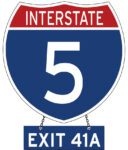 Editor’s Note: This is the 10th chapter in Volume 3 of Editor Emeritus Donald H. Harrison’s 2022 trilogy, “Schlepping and Schmoozing Along the Interstate 5.” All three books as well as others written by Harrison may be purchased from Amazon.com.
Editor’s Note: This is the 10th chapter in Volume 3 of Editor Emeritus Donald H. Harrison’s 2022 trilogy, “Schlepping and Schmoozing Along the Interstate 5.” All three books as well as others written by Harrison may be purchased from Amazon.com.
Schlepping and Schmoozing Along the Interstate 5, Volume 3, Exit 41A (Santa Fe Drive): Rady’s Children’s Neonatal Intensive Care Unit
From northbound Interstate 5, take the Santa Fe Drive exit, turn left onto Santa Fe Drive and then right into driveway for the Rady Children’s Neonatal Intensive Care Unit at Scripps Memorial Hospital in Encinitas. Address is 354 Santa Fe Drive.
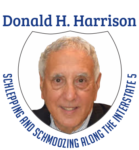
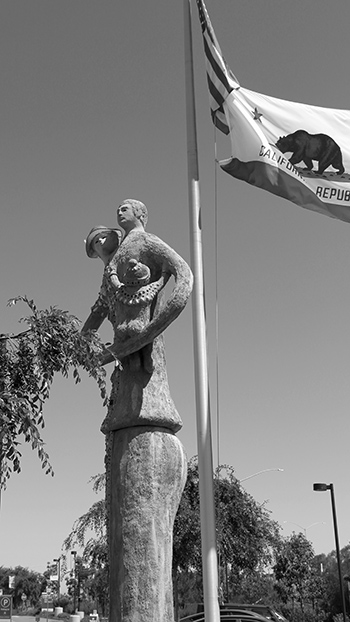
ENCINITAS, California – Although the main 551-bed Rady Children’s Hospital is located in San Diego, its expertise in neonatal care is so well recognized that another hospital system contracts with Rady to provide its services on its campuses. Rady Children’s Hospital operates Level II Neonatal Intensive Care Unites (NICUs) here at Scripps Memorial Hospital Encinitas as well as at Scripps Hospitals in San Diego and Chula Vista. Rady Children’s Hospital also runs a Level III NICU for more critical cases at Scripps Memorial Hospital in La Jolla. The utmost level of care, Level IV, is available at Rady Children’s Hospital itself.
These NICUs as well as Rady Children’s Hospital itself are named for Jewish businessman and philanthropist Ernest Rady, a native of Winnipeg, Canada. He and his wife Evelyn moved in 1966 when he was 29 to San Diego and proceeded to make a fortune in banking, finance insurance, oil and gas, and real estate.
Rady had grown up in a family with several successful businesspeople. His maternal uncle Samuel Bronfman built Joseph E. Seagram & Sons into a whisky-producing empire with such labels as Dewars, Calvert, and Seagram’s Seven Crown. His first cousin Edgar M. Bronfman, who was Samuel’s successor at Seagram, served as president of the World Jewish Congress from 1981 to 2007.
Although Rady’s mother, Rose Bronfman Rady, was awarded a $1 million share of the Seagram’s fortune by her brother Samuel, Ernest was no stranger to manual labor. As a teenager, he worked in a fish factory and spent a summer working in a lumber yard. His father, Dr. Maxwell Rady, a well-respected OB/GYN in Winnipeg, suffered a stroke followed by dementia, resulting in Ernest, while still a teenager, becoming responsible for managing the family’s finances, with the help of three of his father’s friends.
Rady’s father was a hard-working immigrant from Russia who became the first Jewish graduate of the University of Manitoba’s medical school. “He worked hard and loved what he did,” Rady commented in 2018 while receiving an award from the Horatio Alger Association of Distinguished Americans. “He was loving and kind and a successful doctor. At one point in my youth, I thought I might like to be a doctor. My father arranged for me to come to the hospital and watch an appendectomy, but at the first sight of blood, they had to carry me out of the room. That ended any dreams I may have had to be a doctor.
Max Rady died in 1961 when Ernest was 24. Rose mentioned to her son that someone told her that Max had dementia. “She loved him so much she never saw how greatly he had deteriorated,” he recalled. “It was the biggest lie of my life to tell her that there was nothing the matter with father.”
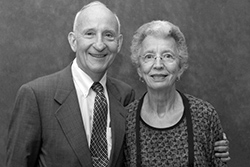
In 2016, Ernest and Evelyn donated in Canadian money $30 million to the University of Manitoba in honor of his father and mother for whom the Rady College of Medicine and the Rady Faculty of Health Sciences were named. In 2009, Ernest and his sisters (Mindel and Marjorie) gave the U of M College of Medicine $900,000 to establish the Mindermar Professorship in Human Simulation. In 1997, Ernest also had honored his Canadian origins by providing the lead gift for the Rose and Max Rady Jewish Community Centre in Winnipeg.
He told of how he became involved with Children’s Hospital during a 2008 interview with Juli Iacuaniello, a writer for the Rady Business Journal, a publication of the Rady School of Management at UC San Diego. While building one of his businesses in 1980, he said, “a gentleman that I was working with had a deaf child and Children’s helped them immensely. One day, he asked me if I wanted to be on the board of directors. I agreed and ended up serving in various positions over the years, including chairman of the board. Through my involvement, I was able to see the inner workings and challenges faced by Children’s. It is difficult to raise money for children’s hospitals because most donations to hospitals are made by elderly people, who typically donate to adult hospitals to ensure better care for themselves when they need it. Most young parents aren’t at a stage where they can give as much. Working with Children’s Hospital has been so rewarding and has given me so much, many times more than I ever imagined, and more than I gave!”
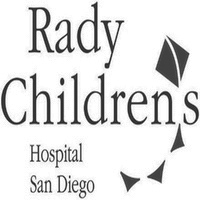 “More than I gave” is quite a lot. In 2006 – the year Children’s Hospital was named for him – Ernest and Evelyn Rady and American Assets, Inc. collectively donated $60 million to Children’s Hospital and Health Center to support the hospital’s pediatric health care mission and to rename the hospital Rady Children’s Hospital and Health Center.
“More than I gave” is quite a lot. In 2006 – the year Children’s Hospital was named for him – Ernest and Evelyn Rady and American Assets, Inc. collectively donated $60 million to Children’s Hospital and Health Center to support the hospital’s pediatric health care mission and to rename the hospital Rady Children’s Hospital and Health Center.
In 2014, Rady made a $120 million donation to establish the Rady Children’s Institute for Genomic Medicine. The Institute, according to its self-description, “is leading the way of advancing precision healthcare through genomic and systems medicine research. Discoveries at the Institute are enabling rapid diagnosis and targeted treatment of critically ill newborns and pediatric patients at Rady Children’s Hospital-San Diego and partner hospitals. The vision is to expand delivery of this integrated translational research process to enable the practice of precision pediatric medicine at children’s hospitals across California, the nation, and the world.” In June 2022, the Institute announced it was embarking on a program to use blood from the heel of new-born babies to test for 400 genetic diseases which can be treated before symptoms develop.
In 2018, Ernest and Evelyn announced a $200 million gift to Rady Children’s Hospital to redevelop and expand its facilities.
“Evelyn and I have gotten a great deal of pride and satisfaction from the wonderful care that the people at Rady Children’s Hospital have provided to the children of our community,” he stated at the time. “We are fortunate in San Diego to have easy access to the best doctors, nurses, scientists, technicians and care providers in the world.”
Conscious of keeping himself in good health, Rady commented to a Canadian newspaper reporter in 2021, “I have exercised every day for 50 years, but I hate it. The best part of exercising is when it is over!”
None of Rady’s financial contributions to the health sciences would have been possible without the remarkable successes he had as a businessman.
Having been forced as a teenager to become responsible for investments for his mother and two sisters, Mindel and Marjorie, Rady majored in commerce at the University of Manitoba. On the way to winning the University Gold Medal in Commerce awarded to the top student in that major, Rady took over the family finances and made them a lot of money. Thereafter, he enrolled at the University of Manitoba law school, eventually earning the Law Society Award for Academic Achievement in Law.
“I didn’t like law school,” he commented. “I knew that after the first year I didn’t want to practice law, but my mother thought it was important that I get my degree, and I did that for her.”
Before arriving in San Diego, Rady became involved in the oil and gas exploration business, purchasing an interest in Summit Resources. In that 2008 interview with Iacuaniello, he commented, “I started five independent oil and gas companies to become the second largest independent player in Western Canada, later selling this business to the largest one. Perhaps I sold too early, but I looked at the economics of the business – the small players were finding oil for $10-15 a barrel, while the majors were finding it for $5 in exploration costs. I realized I had to go with the majors.”
After arriving in San Diego, he purchased a half interest in a construction rental company and a controlling interest in Western Homes. Creating American Assets in 1967, his first real estate investment was a $35,000 interest in an apartment complex in El Cajon. In 1968, he purchased a majority interest in Dixieline Lumber, which he sold in 1975 to Weyerhaeuser. Over the years he became involved in a number of other local businesses, including a local beer distributorship, a partnership group that briefly owned the San Diego Padres, and a broadcast station.
In 1971, Rady founded Western Thrift and Loan, which subsequently was renamed Westcorp and was purchased for $3.9 billion by Wachovia Bank. “Westcorp was started out of a trailer with $850,000,” he commented. “I built that business by continually raising my sights and associating with good people. The business can’t walk out the door if an employee decides to leave. Also, I never invested in anything too technical. I’m a meat and potatoes kind of guy.”
In referring to American Assets Trust Inc., Rady said that another rule he established for himself was to work in high-value real estate markets where for competitors there would be high barriers to entry. He specialized in the purchase of real estate in Hawaii, San Diego, San Francisco, Monterey, Oregon, and Washington. In 2011, the year he took the company public, it controlled approximately 3.1 million square feet of rentable space, 2,122 multifamily units, and owned a 369-room, all-suite hotel.
Forbes magazine in 2008 rated Rady as the 743rd richest person in the world. At that time American Assets was valued at $1.8 billion. However, that same year saw an economic recession that had a devastating impact on American Assets. It was so bad, Rady once recalled that “I remember going to an ATM that rejected my card. I was struggling to survive. It was the most difficult time of my life. I don’t sit around licking my wounds, though at the time it was very troublesome. We have made a comeback, frankly. I made back the money I lost.”
The economic downturn spread the seeds of a family dispute. Prior to the recession, Rady told his relatives that he was considering purchasing their American Assets stock, indicating to them the approximate value. Stock values plummeted during the recession and the relatives could not come to a consensus on selling, so Rady did not go through with the possible purchase. Family members sued, accusing him of breaking a contract, but the jury unanimously held no contract had ever been made. Though he won the case in 2012, Rady expressed regret over the family rupture. Less than a week after the verdict, he and the family members reached an out-of-court agreement over the disposition of some $500 million in American Assets.
There were other instances of well-publicized family tsuris. On Feb. 6, 2007, Evelyn Rady and a maid were tied up by an intruder, who began ransacking the Rady’s La Jolla home. At 6 p.m., Rady returned home from work, was surprised by the intruder, who also tied him up and then continued to search for valuables until 10 p.m., when he finally left, never to be caught or prosecuted. All the man got away with was $43 in cash, having spurned the Canadian money that Rady, just returned from a trip to Canada, had in his wallet.
After the break-in, Rady’s son Harry felt it was necessary to increase his own family’s security, so he stocked u on guns to protect his wife, two children, and home. Some of the weapons included three semi-automatic Romanian AK47s that were illegal in California, prompting his arrest by federal agents. In 2016, Harry was sentenced to 10-months house arrest, three-years probation, and a $75,000 fine.
In 2004, Rady made a $30 million gift to UC San Diego to establish the Rady School of Management. The school featured four large seminar rooms with theater seating, smaller classrooms and multipurpose rooms, conference rooms, a library, a student center, an executive development suite, and faculty and staff offices. He commented, “I wanted to help provide a way others can enjoy their career as much as I have. I also guess that I wanted to leave a legacy in a sense. Business schools help build a foundation, teaching students things that would otherwise take many years to learn.”
As was the case with Rady’s Children’s Hospital, Rady’s initial gift to UC San Diego led to others. In 2014, he pledged $1 million in matching funds to provide fellowships to attract outstanding MBA students. In 2015, he and Evelyn committed another $100 million to recruit and retain faculty and fund strategic priorities at the Rady School.
At the time, Rady articulated what he called his Return on Life (ROL) philosophy. “We want the resources that we’ve been fortunate enough to accumulate to help other people,” he said. “My close relationship with the Rady School of Management has enriched my life. I didn’t truly appreciate the speed or depth of impact that this program could have on a single individual and the multiplier effect that individual could have on others. I expect to see results compound and the graduates have an even greater impact in the future. For me that is the best ROL of all.”
Evelyn, his wife, was a social worker who had occupied some senior positions at Jewish Family Service, including president of the organization. In 2016, she and Ernest donated $17 million in matching funds, plus an $18 million grant for an endowment. In 2018, they increased the matching funds from $17 million to $23.5 million. Separately, the Rady’s have given to JFS repeatedly over the years, including approximately $10 million in aggregate contributions.
“We are deeply committed to the long-term sustainability of Jewish Family Service because of the critical role it plays in the lives of tens of thousands of people of all faiths and backgrounds across San Diego County,” he said. “We challenge the community to join us in supporting this vital resource long into the future. Together, we can make sure JFS never has to tell someone in need, ‘We can’t drive you to your doctor’s appointment, or provide you with a hot meal, or offer counseling to get you through this rough patch because the agency doesn’t have the necessary resources.’”
That contribution was perhaps the most notable example of his generosity and participation in the Jewish community. A member of Congregation Beth Israel, he served as president of the United Jewish Federation and as a chairman of the National Conference of Christians and Jews.
In the larger San Diego community, he served as a member of UC San Diego’s Chancellor’s Associates, as a trustee of the Salk Institute of Biological Studies, and as a trustee of the Scripps Foundation for Medicine and Science. His business associations include the World Presidents Organization (WPO) and the T.E.C. (The Executive Committee).
In 2018 Ernest and Evelyn Rady signed “The Giving Pledge, which was founded by Bill Gates and Warren Buffett, and is described as a “campaign to encourage extremely wealthy people to contribute a majority of their wealth to philanthropic causes.”
That same year, in addition to their contribution to JFS, Ernest and Evelyn contributed $50 million to the Salvation Army for two facilities, the Rady Residence at the Door of Hope on the Rady Campus and the Rady Center at the Salvation Army’s Centre City Campus in downtown San Diego.
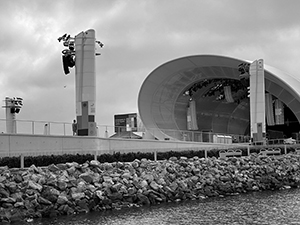
In 2019, groundbreaking occurred for the Rady Shell, the $85 million outdoor venue of the San Diego Symphony Orchestra, for which Evelyn and Ernest donated the lead gift of $15 million. Other major contributions were $12.5 million from the Conrad Prebys Foundation, $11 million from Joan and Irwin Jacobs, and $10 million from Una Davis. The Rady Shell is located in Jacobs Park, where as many as 10,000 concert goers may be seated upon a sloping lawn. The Jacobs family had been major contributors to the symphony, including a record-breaking $120 million gift in 2002. Rady modestly commented when the Shell opened in 2021, “My wife’s and my participation is really minor compared to that of Irwin & Joan Jacobs, Warren Kessler (a longtime symphony board member) and Martha Gilmer (the symphony’s CEO), who is a wonderful human being. This never would have occurred without her vision.”
In 2022, Wallmine estimated Rady’s remaining net worth to be at a very minimum $75.2 million. At the time he owned 9,614 shares of American Assets Trust Inc., and commanded an annual salary of $3,784,460 as that company’s chairman of the board, president, and chief executive officer.
Rady told the Horatio Alger Association that ethical business conduct “proved to be the smartest strategy because the trust we engender with clients actually produces profits. I’m very grateful for the career I’ve had. I’ve always loved what I do. When you have that, then work is a joy. Even today, at the age of 80 (in 2017), I can hardly wait to get to the office.
*
Donald H. Harrison is editor emeritus of San Diego Jewish World. He may be contacted via donald.harrison@sdjewishworld.com
A wonderful, detailed, in-depth bio of two most generous philanthropists.